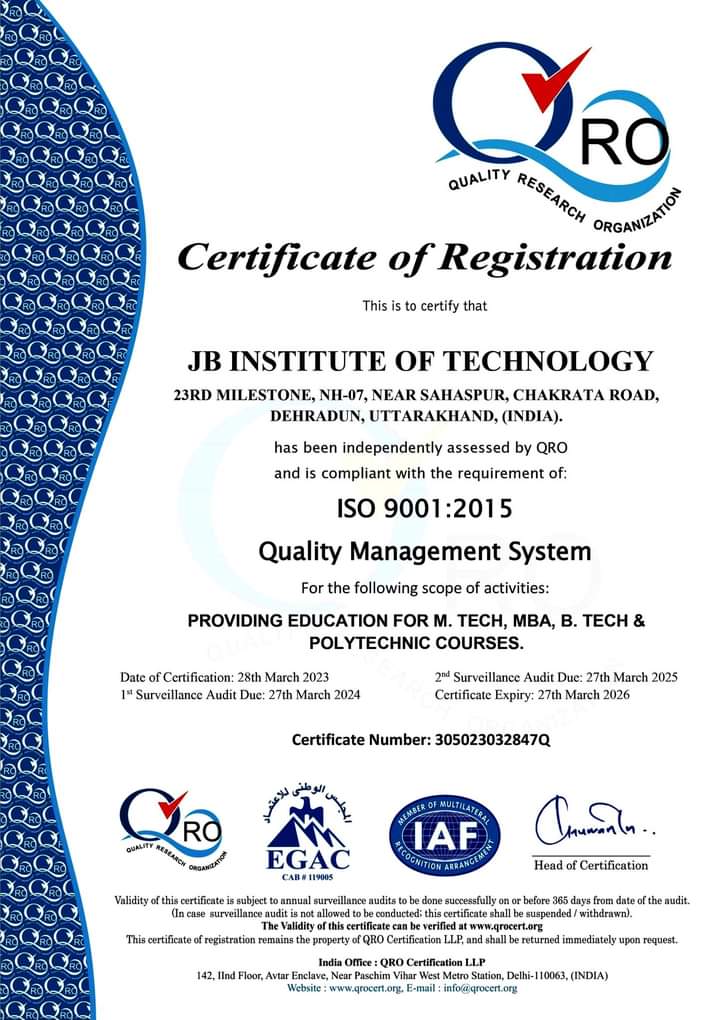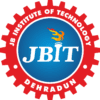About iqac
Internal Quality Assurance Cell (IQAC)
VISION
To generate systematic quality processes in the Institute for evolving, enhancing and sustaining excellence in its academic and administrative practices to ensure the highest standards of quality, transparency and holistic development.
MISSION
- To develop quality culture in the institution and application of quality benchmarks for quality enhancement in academic and administrative performance.
- To be the driving force for escorting the quality related activities including dissemination of information on various quality parameters and to remove deficiencies, if any.
- To facilitate the creation of a learner-centric environment conducive to quality and value based education using ICT tools and accelerating participatory teaching – learning process.
- To ensure a well defined mechanism for collecting feedback response from students, alumni and other stakeholders on quality related institutional processes.
- To promote research cultures among faculty and students the departments are encouraged to organize inter and intra institutional Workshops, IPR, Seminar and Conferences on quality related themes and promotion of quality circles.
- To organize Faculty Development Programs (FDPs) for teaching and Professional Development Programs (PDPs) for non-teaching staff.
- Documentation of various programs/activities leading to quality improvements.
- To ensure an effective and transparent operations to achieve excellence in Academic, Administrative and Financial activities followed by timely Academic and Administrative Audit of the departments to measure their annual progress.
- Development and maintenance of institutional database through MIS portal for the purpose of maintaining and enhancing of the institutional quality.
- To sensitize students about Institutional and Social Responsibility through various activities and participatory programming.
| Sr.No | Name | Designation |
|---|---|---|
| 1. | Dr. Pitamber kumar Chaudhary | Director |
| 2. | Dr. M. K. Arora | Professor, Dept. of Applied Science & Humanities |
| 3. | Dr. Sunil kumar | Associate Professor, Dept. of Electronics & Communication Engineering |
| 4. | Dr. Sanjeev Gill | Professor, Dept. of Civil Engineering |
| 5. | Mr. Manoj Chaudhary | Associate Professor, Dept. of Computer Sci. & Engineering and AI & ML |
| 6. | Mr. Lakhan Singh | Associate Professor, Dept. of Electrical Engineering |
| 7. | Mr. Sumit Kumar | Associate Professor, Dept. of Mechanical Engineering |
| 8. | Dr. Bharat VPS Rawat | Associate Professor, Dept. of Mechanical Engineering |
| 9. | Dr. Neeraj Kumar | Associate Professor, Dept. of Applied Science & Humanities |
| 10. | Sh. Sandeep Singhal | Vice-Chairman, Jai Bhagwan Educational Society |
| 11. | Dr. Vishant Kumar | Registrar |
| 12. | Mr. Punit Kumar | Controller of Examination |
| 13. | Mohammad Imran Khan | IQAC Incharge |
| 14. | Smt. Baby Rani | GramPradhan, ShashpurDehradun Uttarakhand |
| 15 | Ms. Ritika Saini, CSE | Students |
| 16 | Ms. Aysha, CSE | Alumni |
| 17 | Mr. Naresh Bansal | Industrialists |
| 18 | Mr. Bipin Vidhan | HR, Avtra Corporation (Employer) |
| 19 | Mr. Ravi Bharthwal | HR, Zircon Technologies India Limited (Employer) |
| 20 | Mohammad Yunus | Parent |
| 21 | Dr. S.K. Chaudhary | Associate Professor, Dept. of Applied Science & Humanities (IQAC Coordinator) |
MEETING MINUTES
| S.No. | Year | Meeting Report |
| 1. | 2022-23 | IQAC 1st MINUTES OF MEETING |
| 2. | 2022-23 | IQAC 2nd MINUTES OF MEETING |
| 3 | 2022-23 | IQAC 3rd MINUTES OF MEETING |
| 4 | 2021-22 | IQAC 1st MINUTES OF MEETING |
| 5 | 2021-22 | IQAC 2nd MINUTES OF MEETING |
| 6 | 2021-22 | IQAC 3rd MINUTES OF MEETING |
| 7 | 2020-21 | IQAC 1st MINUTES OF MEETING |
| 8 | 2020-21 | IQAC 2nd MINUTES OF MEETING |
| 9 | 2020-21 | IQAC 3rd MINUTES OF MEETING |
| 10 | 2019-20 | IQAC 1st MINUTES OF MEETING |
| 11 | 2019-20 | IQAC 2nd MINUTES OF MEETING |
| 12 | 2019-20 | IQAC 3rd MINUTES OF MEETING |
| 13 | 2018-19 | IQAC 1st MINUTES OF MEETING |
| 14 | 2018-19 | IQAC 2nd MINUTES OF MEETING |
| 15 | 2018-19 | IQAC 3rd MINUTES OF MEETING |
Strategies: Shall evolve mechanism and procedures for:-
- Curriculum Enhancement: To regularly review the teaching learning the prescribed curriculum to ensure it aligns with industry trends and incorporates modern teaching methodologies, fostering critical thinking, creativity, and practical skills.
- Faculty Development: To organize workshops, seminars, and training sessions to enhance the professional skills and expertise of faculty members, promoting a culture of continuous learning and research.
- Student Support: To establish a robust support system for students, extension activities, sports, co-curricular, extra- curricular activities and mentoring programs to address their academic and personal needs effectively for the holistic developments of students.
- Research and Innovation Promotion: To encourage research activities among faculty and students through research seeding monetary help, incentives, and collaborative projects, driving the institution towards becoming a centre of innovation and knowledge creation.
- Accreditation and Quality Assurance: To work towards achieving and maintaining national and international accreditations, using internal and external quality audits to monitor and improve institutional processes.
- Industry Collaborations: To foster strong ties with industries and employers through MoUs to ensure that academic programs are relevant and meet the demands of the job market, providing students with better placement opportunities.
- Ethical Practices and Social Responsibility: To promote ethical values and social responsibility through community engagement programs and initiatives that address local societal needs and challenges.
- Transparent Governance: To establish transparent and accountable governance practices, ensuring effective decision-making and resource management for the benefit of all stakeholders.
- Data-Driven Decision-Making: To use data analytics and institutional research to make informed decisions, identifying areas for improvement and optimizing resource allocation.
- Continuous Feedback and Improvement: To encourage regular feedback from all stakeholders, including students, faculty, employers, and alumni, to continually assess the effectiveness of policies and processes and make necessary improvements.
Functions: Some of the functions expected of the IQAC are:-
Establishing and implementing mechanisms for quality assurance and continuous improvement.
Assisting in achieving and maintaining accreditation from recognized bodies.
Aligning institutional plans and policies with quality enhancement goals.
Reviewing teaching learning of the curriculum to meet industry demands and students’ needs.
Periodical conduct of annual Academic and Administrative Audit and its follow-up
Motivating to organize faculty development programs (FDPs) to enhance teaching and research capabilities.
Promoting a research culture, facilitating research projects, and fostering innovation through research committee.
Providing support services and counselling to address student academic and personal needs.
Collecting feedback from all the stakeholders and incorporating their inputs in decision-making through feedback committee.
Analyzing data to make informed decisions and identify areas for improvement.
Preparing periodic reports and documentation on quality enhancement activities.
Documentation of various programmes and activities leading to quality improvements.
Identifying and promoting best practices in higher education and quality assurance.
Initiating activities for social responsibility and community engagements.
Benefits: will facilitate/ contribute to:-
- Ensure a systematic and continuous improvement approach to enhance quality in academic programs, research, and administrative processes. Hence act like a dynamic system for quality changes in the Institute
- Ensure efforts towards maintaining quality standards contribute to the institution’s accreditation and recognition, enhancing its reputation nationally and internationally.
- Ensure internalization of quality culture with all good practices.
- Provide a sound basis for decision making to improve institutional functioning.
- Ensure the incorporation of feedback analysis to meet suggestions and expectations of all stakeholders by IQAC in the institution’s services
- It promotes transparency and accountability in the institution’s governance and decision-making processes, fostering trust among stakeholders.
- Regular monitoring and evaluation help identify areas of improvement promptly, allowing timely corrective measures.
- Emphasis on research and innovation culture encourages faculty and students to contribute to updated knowledge creation and technological upliftment.
Outcomes of IQAC activities :
- It led to the continuous enhancement of relevant and high quality academic programs.
- Recognition in the form of Appreciation letters and prizes as medals & mementoes by different authorities of State and Central Government, NGOs and Local Bodies.
- YRC (Youth Red Cross )unit of the Institute has been rewarded by Hon’ble Governor of the Uttarakhand State.
- Curriculum teaching–learning development has ensured that academic offerings align with industry demands, enhancing students’ employability.
- Remarkable improvement in campus and pool Placement of students of the Institute with a good salary packages.
- Faculty development programs have improved teaching methodologies, research capabilities, and professional growth of faculty members.
- A systematic approach has contributed significantly to successful accreditation and recognition from reputed bodies.
- The organization of Conferences/Seminars and Workshops in the institute has been improved.
- The faculty participation has been improved tremendously.
- Focus on promoting research has led to an increase in research publications and projects undertaken by the faculty and the students.
- Emphasis on transparency and accountability has fostered a culture of good governance and responsible decision-making.
- IQAC’s continuous monitoring and evaluation have helped to identify areas for improvement and implement necessary changes proactively.
ISO CERTIFICATE


